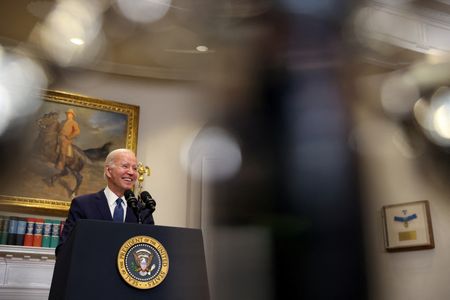By Moira Warburton, Diane Bartz and Idrees Ali
WASHINGTON (Reuters) -U.S. President Joe Biden on Sunday finalized a budget agreement with House Speaker Kevin McCarthy to suspend the $31.4 trillion debt ceiling until Jan. 1, 2025, and said the deal was ready to move to Congress for a vote.
“This is a deal that’s good news for … the American people,” Biden told reporters at the White House after a call with McCarthy to put the final touches to a tentative deal they struck on Saturday night.
“It takes the threat of catastrophic default off the table, protects our hard-earned and historic economic recovery,” Biden said.
The deal, if approved, will prevent the U.S. government from defaulting on its debt and comes after weeks of heated negotiations between Biden and House Republicans.
It still needs to pass through a narrowly divided Congress before June 5, when the U.S. Treasury says it would run short of money to cover all of its obligations.
“I strongly urge both chambers to pass that agreement,” Biden said, adding that he expected McCarthy to have the necessary votes for the deal to pass.
The deal has drawn fire from hardline Republicans and progressive Democrats, but Biden and McCarthy are banking on getting enough votes from both sides.
McCarthy earlier on Sunday predicted he would have the support of a majority of his fellow Republicans, and House Democratic leader Hakeem Jeffries said he expected Democratic support.
The agreement would suspend the debt limit through January 1 of 2025, cap spending in the 2024 and 2025 budgets, claw back unused COVID funds, speed up the permitting process for some energy projects and include extra work requirements for food aid programs for poor Americans.
The 99-page bill would authorize more than $886 billion for security spending in fiscal year 2024 and over $703 billion in non-security spending for the same year, not including some adjustments. It would also authorize a 1% increase for security spending in fiscal year 2025.
Senate Republican Leader Mitch McConnell applauded the agreement and called on the Senate to act swiftly to pass it without unnecessary delay once it has gone through the House.
“Today’s agreement makes urgent progress toward preserving our nation’s full faith and credit and a much-needed step toward getting its financial house in order,” McConnell said.
Members of the Republican hardline Freedom Caucus said they would try to prevent the agreement from passing in a House vote expected on Wednesday.
“We’re going to try,” Representative Chip Roy, a prominent Freedom Caucus member, said in a tweet.
McCarthy dismissed threats of opposition within his own party, saying “over 95%” of House Republicans were “overwhelmingly excited” about the deal.
“This is a good strong bill that a majority of Republicans will vote for,” the California Republican told reporters in the U.S. Capitol. “You’re going to have Republicans and Democrats be able to move this to the president.”
MCCARTHY NOT WORRIED
To win the speaker’s gavel, McCarthy agreed to enable any single House member to call for a vote to unseat him, potentially making him vulnerable to ouster by disgruntled Republicans. But he has said he is “not at all” concerned about that possibility during the debt ceiling debate.
Republicans control the House by 222-213, while Democrats control the Senate by 51-49. These narrow margins mean that moderates from both sides will have to support the bill if it is opposed by hardliners in either or both parties.
“I’m not happy with some of the things I’m hearing about,” Representative Pramila Jayapal, who chairs the Congressional Progressive Caucus, told CNN’s “State of the Union.”
She praised the deal that she said would save Medicaid from benefit cuts while expanding the safety net to veterans and homeless people. “We kept the student debt responsibility that we have,” she said, referring to Biden’s policy of limited loan forgiveness.
Progressive Democrats in both chambers had said they would not support any deal that had additional work requirements for government food and healthcare programs.
The deal does add work requirements to food aid for some people aged 50 to 54, but White House officials said the carefully worded text would mean that roughly the same number of people would be subject to the requirements as is the case under current law.
(Reporting by Moira Warburton, Steve Holland, Diane Bartz, Daphne Psaledakis, Richard Cowan, Trevor Hunnicutt and Idrees Ali; Writing by David Morgan and Humeyra Pamuk; Editing by Heather Timmons, Mark Porter, Andrea Ricci, Deepa Babington and Lincoln Feast.)





